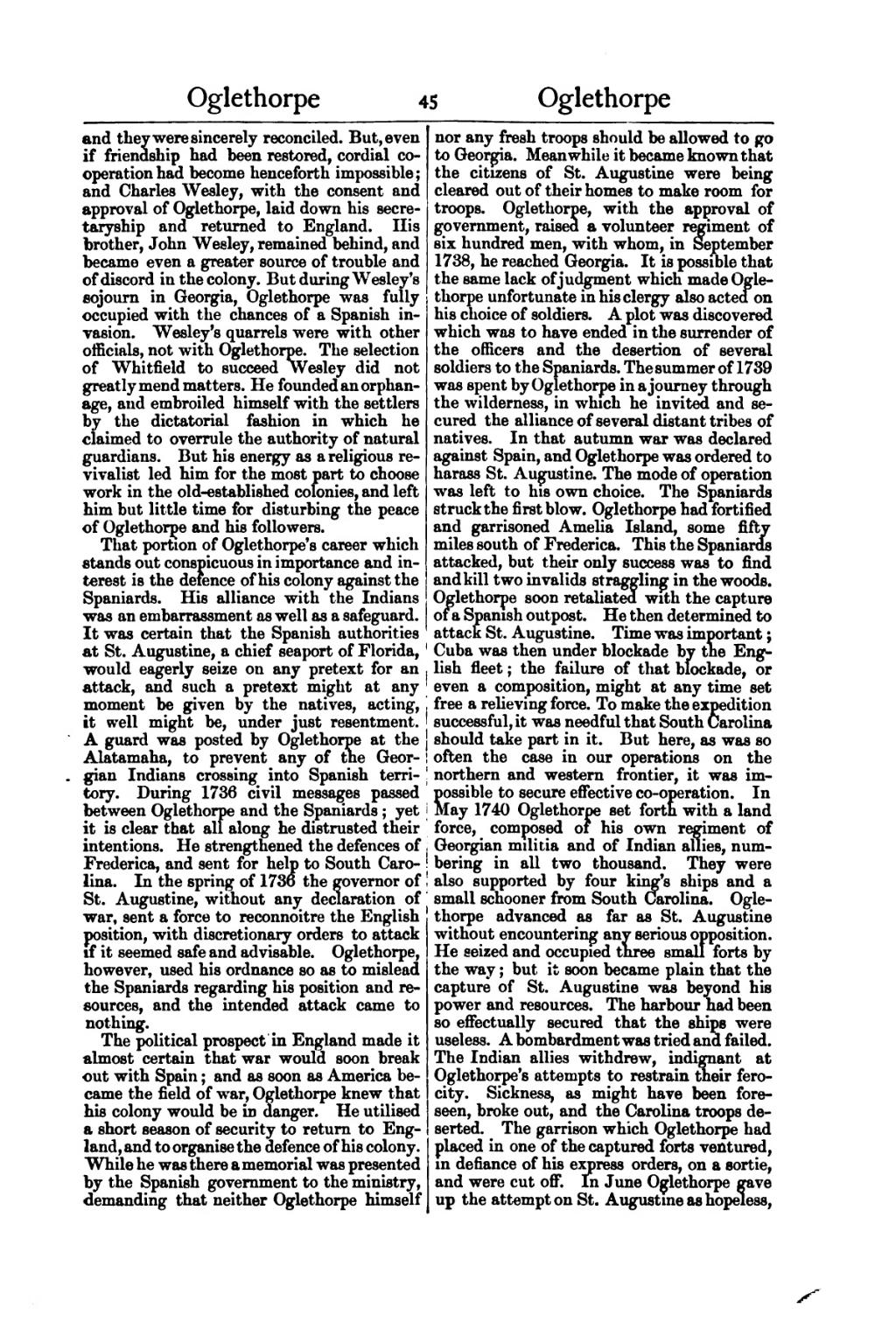and they were sincerely reconciled. But, even if friendahip had been restored, cordial cooperation had become henceforth impossible; and Charles Wesley, with the consent and approval of Oglethorpe, laid down his secretaryship and returned to England. His brother, John Wesley, remained behind, and became even a greater source of trouble and of discord in the colony. But during Wesley'*s sojourn in Georgia, Oglethorpe was fully occupied with the chances of a Spanish invasion. Wesley's quarrels were with other officials, not with Oglethorpe. The selection of Whitfield to succeed Wesley did not greatly mend matters. He founded an orphanage, and embroiled himself with the settlers by the dictatorial fashion in which he claimed to overrule the authority of natural guardians. But his energy as a religious revivalist led him for the most part to choose work in the old-established colonies, and left him but little time for disturbing the peace of Oglethorpe and his followers. That portion of Oglethorpe's career which stands out conspicuous in importance and interest is the defence of his colony against the Spaniards. His alliance with the Indians was an embarrassment as well as a safeguard. It was certain that the Spanish authorities at St. Augustine, a chief seaport of Florida, would eagerly seize on any pretext for an attack, and such a pretext might at any moment be given by the natives, acting, it well might be, under just resentment. A guard was posted by Oglethorpe at the Alatamaha, to prevent any of the Georgian Indians crossing into Spanish territory. During 1786 civil messages passed between Oglethorpe and the Spaniards; yet it is clear that all along he distrusted their intentions. He strengthened the defences of Frederica, and sent for help to South Carolina. In the spring of 1736 the governor of St. Augustine, without any declaration of war, sent a force to reconnoitre the English position, with discretionary orders to attack if it seemed safe and advisable. Oglethorpe, however, used his ordnance so as to mislead the Spaniards regarding his position and resources, and the intended attack came to nothing.
The political prospect in England made it almost certain that war would soon break out with Spain; and as soon as America became the field of war, Oglethorpe knew that his colony would be in danger. He utilised a short season of security to return to England, and to organise the defence of his colony. While he was there a memorial was presented by the Spanish government to the ministry, demanding that neither Oglethorpe himself nor any fresh troops should be allowed to go to Georpa. Meanwhile it became known that the citizens of St. Augustine were being cleared out of their homes to make room for troops. Oglethorpe, with the approval of government, raised a volunteer regiment of six hundred men, with whom, in September 1738, he reached Georgia. It is possible that the same lack of judgment which made Oglethorpe unfortunate in his clergy also acted on his choice of soldiers. A plot was discovered which was to have ended in the surrender of the officers and the desertion of several soldiers to the Spaniards. The summer of 1739 was spent by Oglethorpe in a journey through the wilderness, in which he invited and secured the alliance of several distant tribes of natives. In that autunm war was declared against Spain, and Oglethorpe was ordered to harass St. Augustine. The mode of operation was left to his own choice. The Spaniards struck the first blow. Oglethorpe had fortified and garrisoned Amelia Island, some fifty miles south of Frederica. This the Spaniards attacked, but their only success was to find and kill two invalids straggling in the woods. Oglethorpe soon retaliated with the capture of a Spanish outpost. He then determined to attack St. Augustine. Time was important; Cuba was then under blockade by the English fleet; the failure of that blockade, or even a composition, might at any time set free a relieving force. To make the expedition successful, it was needful that South Carolina should take part in it. But here, as was so often the case in our operations on the northern and western frontier, it was impossible to secure efl^ective co-operation. In May 1740 Oglethorpe set forth with a land force, composed of his own regiment of Georgian militia and of Indian allies, numbering in all two thousand. They were also supported by four king's ships and a small schooner from South Carolina. Oglethorpe advanced as far as St. Augustine without encountering any serious opposition. He seized and occupied three small forts by the way; but it soon became plain that the capture of St. Augustine was beyond his power and resources. The harbour had been so effectually secured that the ships were useless. A bombardment was tried and failed. The Indian allies withdrew, indignant at Oglethorpe's attempts to restrain their ferocity. Sickness, as might have been foreseen, broke out, and the Carolina troops deserted. The garrison which Oglethorpe had placed in one of the captured forts ventured, in defiance of his express orders, on a sortie, and were cut off. In June Oglethorpe gave up the attempt on St. Augustme as hopeless,
